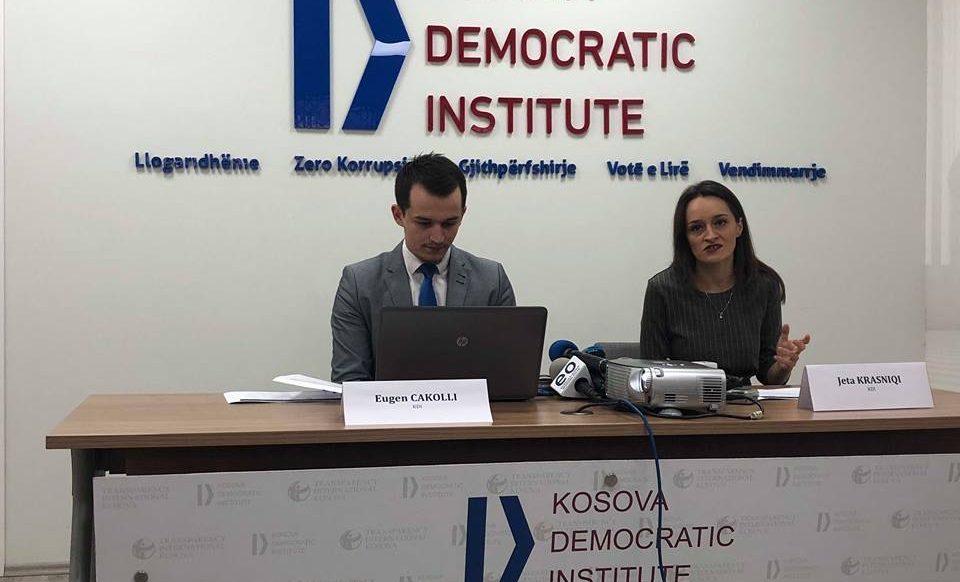


Kosova Democratic Institute (KDI) has disclosed two scenarios, including their positive and negative effects of suspension or continuation of the 100% tariff on the products of Serbia and Bosnia and Herzegovina.
During the media conference in which the analysis was presented, Jeta Krasniqi from KDI said that this analysis tends to give the public a wider picture of the effects that the “suspension” or “holding” of the tariff would produce in some dimensions, first in the Kosovo-Serbia dialogue process itself, then in Kosovo’s relations with international partners, domestic political developments in the country, in the economy and ultimately in citizens’ perception.
Eugen Cakolli from KDI, during the presentation of the first scenario, stressed that maintaining the 100% tariff unveild the real relations between Kosovo and Serbia and the extent to which parties were from normalization, while the main positive effects were the exercise of Kosovo’s state sovereignty in relation to Serbia, turning attention to the level of implementation of the dialogue agreements and Kosovo’s ability to impose relevant topics in the dialogue. As a negative effect was mentioned Serbia’s conditionality to continue with the dialogue and consequently the strengthening of its position in relation to the international community.
He said that, “as regards Kosovo’s relations with international partners, as a positive factor was highlighted the increase in the level of US involvement in the dialogue process, and as a negative effect was said to be the shaking of the support of international partners towards Kosovo, which is manifested through various punitive measures and actions.
Cakolli, speaking on the influences in the domestic political aspect, argued that the positive effect was considered to be the encouragment of debate about the need for a state consensus and the creation of a timeframe for building Kosovo’s official position on the dialogue process. While negative effects are attributed to the polarization between the institution of the President, the Government, the ruling coalition partners and other political entities, as well as the shrinking of Kosovo’s foreign policy only with regard to tariff and dialogue issues.
He added that, “in the economic aspect, the main positive effect is estimated to be the growth in consumption of domestic products, while the negative effects were listed on the rise in prices of certain products and smuggling. The increase of state dignity was deemed to have a positive impact on citizens regarding the 100% tariff levy, while the increase in civic concern for the loss of support from international partners was considered one of the main negative effects on the tax scenario.
In the second scenario “suspension of the 100% tariff”, unlike the first scenario where the positive effects are significantly more pronounced in the domestic political plan in Kosovo, the positive effects would be seen in the sphere of Kosovo’s relations with international partners .
According to Jeta Krasniqi, the main positive effect of the suspension of the tariff would be the continuation of the dialogue and the strengthening of the negotiating position in relation to Serbia, anyway the negative effects would be the continuation of the dialogue without a unique stand of the political spectrum in Kosovo and the risk of reaching an agreement that could pose an unfavorable compromise on Kosovo.
She added that in the external plan, the suspension of the tariff would improve relations between Kosovo and international partners, while the negative pressure that international partners could exercise to reach an agreement between Kosovo and Serbia within an artificial time limit, without paying attention to the content of the final agreement.
She added, that, “the opportunity to unify the stance from the political spectrum and institutions, articulating Kosovo’s clear demands on international partners for the guarantees that should be provided within the dialogue, were said to be the main positive effects. But, as a negative effect, it was considered to be the divide of the political spectrum regarding Kosovo’s approach to Serbia in the process of normalizing relations.
In economic terms, the suspension of the tariff would have a positive effect on increasing customs revenues while reducing the level of consumption of domestic products.
Citizens would welcome maintaining good relations with international partners, in particular with the US. On the other hand, suspension of the tariff would affect the decline of citizens’ credibility towards Kosovo institutions.
These scenarios are realized taking into account the fact that up to now, despite the current political attitudes and discourse, little has been argued about the advantages and disadvantages of the 100% tariff retention option and the option to suspend it.